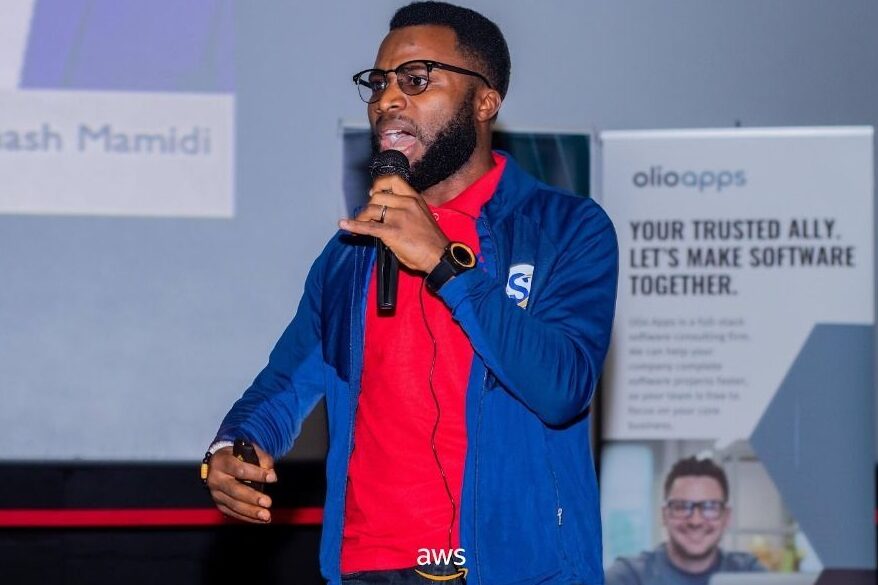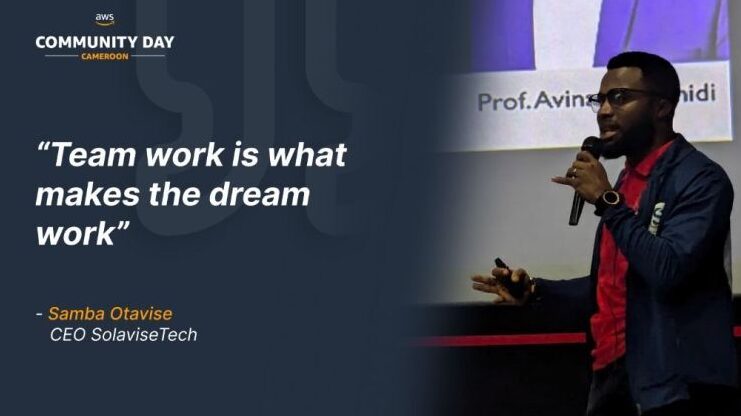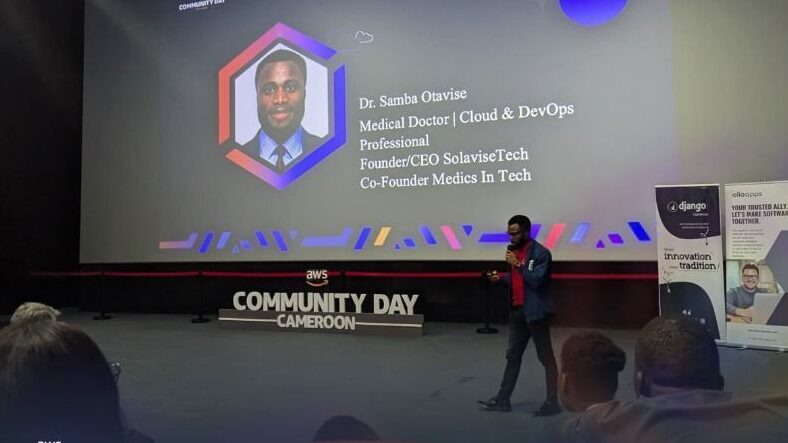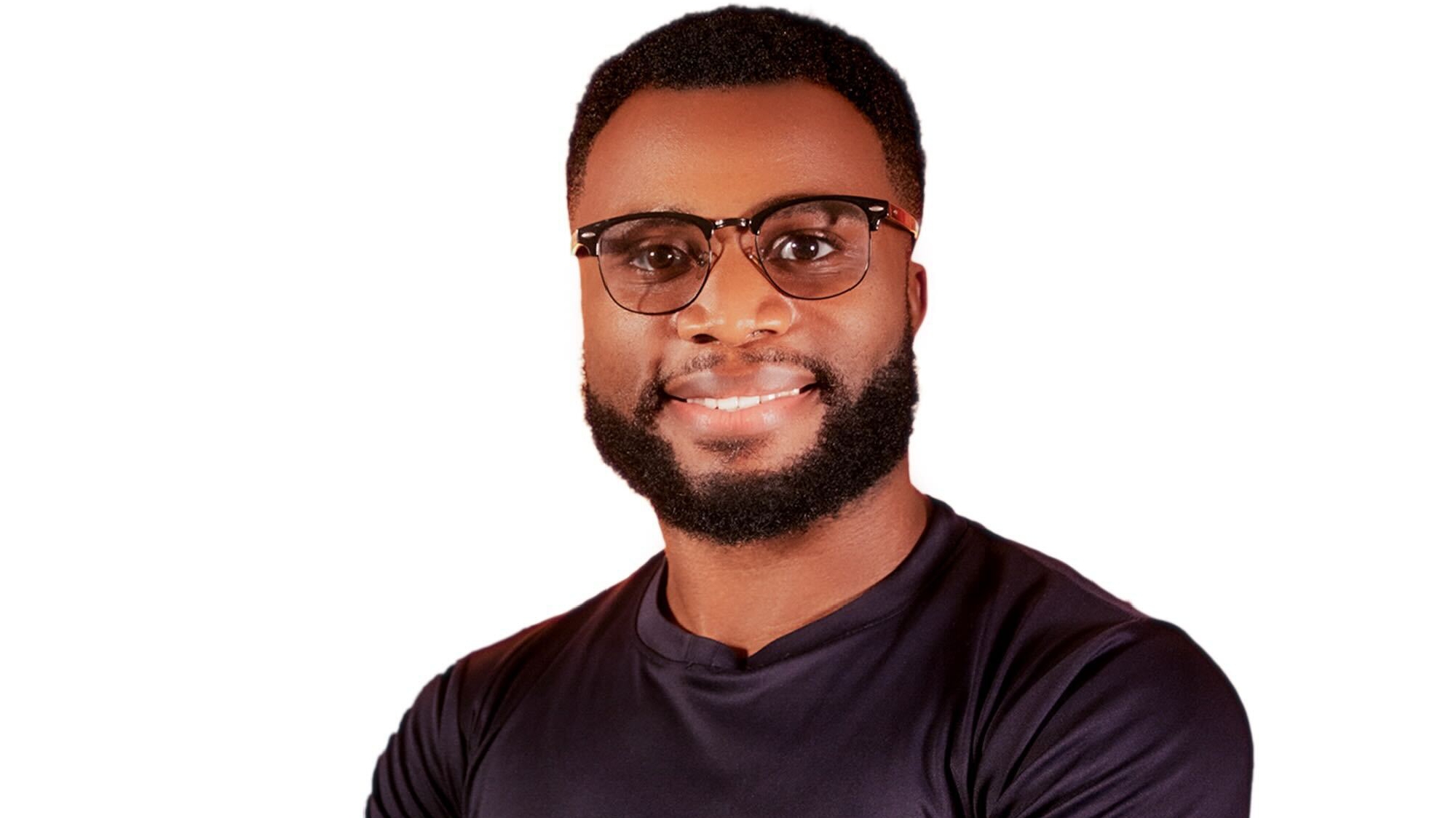Dr Samba Otavise is a celebrated Cameroonian born medical Doctor who after many years in a successful medical practice decided to make a career transition into tech, to become a leading Solutions Architect/DevOps Engineer with demonstrated hands-on experience in the tech industry, applying his skills in designing and implementing IT solutions that align with business objectives.
The prominent medical doctor turned digital health and tech entrepreneur and tech entrepreneur, In a recent discussion with Remotework, shared his inspiring journey of blending healthcare with technology, also emphasizing the transformative power of artificial intelligence (AI) and the necessity of collaboration in today’s workforce.
The Interview
“I initially aspired to be a surgeon or gynecologist. After losing my father just before completing his medical thesis, I faced immense responsibilities as the eldest son in a family affected by displacement due to ongoing crises, I felt celebrated locally, juggling multiple jobs in clinics but yearned for a broader impact.”
“My experience in medicine made me a local hero, but I wanted to be a global one,” he explains. “Recognizing the necessity of tech skills in today’s world, I sought out personal development opportunities and attended various training programs. Inspired by a cousin who transitioned from nursing to a cloud DevOps engineer I took a bold step. Quit my four jobs, sold my car, and dedicated myself to learning technology full-time.’”
For six months, he focused entirely on his studies, with his wife supporting the family during this challenging period. “I wanted to dominate in this field, not just be mediocre,” he stated. This determination led to the creation of Solavis Technologies Institute, which aims to harness technology to improve lives through training in cloud computing, data science, and machine learning.
Dr. Otavise also co-founded Medics in Tech, a platform connecting medical professionals with technology enthusiasts dedicated to healthcare innovation. He serves as the chief marketing officer for Epoch Zero, an AI radiology company in Nigeria, working to enhance diagnostic processes using artificial intelligence.
Today, Dr. Otavise is not just a tech leader but a beacon of hope for aspiring professionals looking to merge technology with healthcare. His journey is a testament to resilience, adaptability, and the transformative power of technology in improving lives.
Dr. Samba Otavise: A Journey from Medicine to Tech
During the conversation, Dr. Samba Otavise shares insights into his remarkable transition from a medical career to the tech industry, emphasizing the importance of mindset and mentorship in navigating this shift.
He began his journey with a strong desire to excel in healthcare, driven by family expectations and personal aspirations. However, after facing significant challenges, including the loss of his father and the pressures of supporting his family, the Doctor realized he wanted a broader impact on the world.
When asked about the difficulties of transitioning from surgery to technology, Dr. Otavise emphasized that true transition is mental, not just physical. “It’s about changing your mindset,” he stated. He highlighted that success principles, such as resilience, teamwork, and attention to detail, are universal and can be applied across fields.

To facilitate his transition, Dr. Otavise said he actively sought mentorship from successful tech leaders, including Professor Jesper Mogge from the U.S., and collaborated with peers who shared his goals. “I had to be humble enough to learn from them,” he explained. He also dedicated himself to teaching his classmates, which reinforced his own understanding of the material.
The determination to succeed led him to invest in his education, paying $2,500 for a six-month training program. He committed to daily study and collaboration with classmates and quickly becoming a study leader in a diverse group of learners.
Today, through his company, Solavis Technologies Institute, Dr. Otavise aims to connect students with global opportunities, ensuring they not only gain knowledge but also find pathways to employment. His story resonates with many young Africans facing similar challenges, demonstrating that with the right mindset, mentorship, and dedication, significant career shifts are possible.
Navigating the Transition to Remote Work
Dr. Samba Otavise explored the complexities of transitioning to remote work, especially in the context of African traditions that emphasize physical presence in the workplace.
Successfully adapting to work from home for over three years, Otavise said he began by highlighting the need for a shift in mindset. “Remote work is not just about location; it’s about results,” he asserted, underscoring that productivity should be the focus, regardless of where the work is performed.
He emphasizes the importance of self-leadership in remote environments. “To lead others effectively, you must first lead yourself,” Dr. Otavise noted, pointing out that self-discipline and accountability are crucial in a remote work setting. He illustrated this with his own experience, managing a diverse team across multiple countries, where collaboration and results drive their success.
Dr. Otavise also addressed the traditional belief in Africa that equates presence with productivity. He argued that the effectiveness of work in an office setting often doesn’t reflect the actual hours spent being productive. “In many cases, people are physically present but not truly engaged in their work,” he explained, advocating for a results-oriented approach instead.
Furthermore, he shared the importance of building a strong network and personal brand to thrive in remote work environments. By investing time in helping others succeed, Dr. Otavise has seen significant growth in his study group, with many members landing senior roles in tech.
His insights serve as a reminder that embracing change and adapting to new work cultures can lead to remarkable opportunities, especially for those willing to challenge traditional norms and prioritize results over physical presence.
Navigating Opportunities and Challenges in Africa’s Remote Work Landscape: Insights from Dr. Samba Otavise
Dr. Samba Otavise discussed the evolving landscape of remote work in Africa, emphasizing both its vast potential and the challenges that persist. He argued that the future of work is shifting away from traditional 9-to-5 jobs, driven by a generation eager to explore technology and multiple job opportunities.
“The younger workforce in Africa is increasingly curious about technology and prefers flexible working arrangements over conventional corporate structures”, he says. Dr. Otavise noted that many are already engaging in multiple remote roles, reflecting a desire for diverse experiences.
The medical doctor insists that remote work allows businesses to save significantly on overhead costs, such as office space and logistics. This is particularly attractive to companies looking to maximize their resources while accessing a global talent pool.

Otavise emphasized the importance of educating the workforce to meet global standards. He believes that fostering a culture of continuous learning and skill development is crucial to positioning African professionals competitively in the remote job market.
By forming partnerships and collaborating with global experts, companies in Africa can enhance their credibility and attract international clients. He said his company, Dr. Otavise’s company, Solavis Tech, actively seeks out collaborations to facilitate knowledge transfer and build trust within the industry.
Challenges to Overcome
1. Work Ethic and Discipline: A significant barrier to success in remote work is the prevailing mindset around time management and accountability. Dr. Otavise highlighted that many individuals in Africa struggle with self-discipline and meeting deadlines, which can hinder their ability to thrive in remote roles.
2. Scarcity vs. Abundance Mindset: He distinguished between those with a scarcity mindset, who focus on limitations and job scarcity, and those with an abundance mindset, who see opportunities in challenges. Encouraging a shift toward the latter is essential for fostering innovation and growth.
3. Collaboration Barriers: Dr. Otavise pointed out that many entrepreneurs in Africa often work in silos, avoiding collaboration and knowledge sharing. He stressed the need for a cultural shift that embraces teamwork and collective success, akin to practices observed in countries like India.
4. Infrastructure Issues: While acknowledging challenges such as inconsistent electricity and internet access, he urged a focus on solutions rather than complaints. Addressing these infrastructural issues is vital for supporting remote work initiatives.
The Future Outlook
Dr. Otavise remains optimistic about Africa’s role in the global tech landscape. He believes that with the right mindset, education, and collaborative spirit, the continent can unlock immense potential in the remote work sector. His vision is clear: the future of tech is not just in Africa, but driven by Africa, harnessing its unique strengths to shape a vibrant digital economy.
He emphasized the necessity of collaboration over individualism to unlock limitless opportunities for Africa. He passionately advocated for unity, urging professionals to set aside egos and work together for the common good. He noted that true progress requires collective effort and a focus on legacy, as many great inventions and successes stem from individuals who prioritized collaboration over personal gain.
Drawing parallels to successful communities, he referenced the Jewish practice of circulating money within their community multiple times before it leaves, contrasting this with the tendency among Africans to quickly spend or move resources outside their community. He argued that to make opportunities boundless, there must be a concerted effort to collaborate and circulate resources, echoing the need for a mindset shift from competition to cooperation.

Dr. Otavise pointed out that successful companies in tech often collaborate behind the scenes, sharing resources and knowledge to grow together. He emphasized that if African professionals could adopt a similar mindset, they could significantly increase their share of the global tech landscape.
Regarding talent in the tech industry, Dr. Otavise emphasized that a positive attitude can often outweigh formal skills, as individuals with the right mindset can learn and adapt on the job. This commitment to quality and attitude ensures that companies seeking talent from their pool can trust the caliber of candidates they receive. The goal is to build a sustainable ecosystem of skilled professionals ready to meet the demands of the global tech industry, ultimately enhancing Africa’s position in the market.
He also emphasized the importance of a candidate’s mindset in the tech industry, pointing out that while many young people are drawn to tech for the financial opportunities, success requires more than just a desire for high earnings. He said his team conducts thorough screenings to identify candidates who possess the right drive and attitude, understanding that a two-dollar mindset cannot lead to six-figure salaries.
To maintain a strong talent pool, Dr. Otavise explained that his organization, Solavis Tech, implements a rigorous qualification process. This ensures that the candidates selected are not only skilled but also motivated to succeed in a demanding remote work environment. By fostering a community around their training programs, they provide ongoing support to help individuals stay aligned with their goals.
When asked about the effectiveness of their efforts, Dr. Otavise acknowledged that while they strive for high retention rates, perfection is unattainable. However, he believes their approach helps mitigate dropouts and builds a supportive ecosystem for aspiring professionals.
Looking to the future, Dr. Otavise expressed optimism about Africa’s potential in the remote work landscape. He highlighted the continent’s untapped resources and talent pool, advocating for improved internet access and supportive policies to facilitate growth. He sees the future of remote work as a way to enhance quality of life, allowing individuals to spend more time with their families and pursue meaningful work.
Otavise also discussed the role of AI in increasing productivity and enabling people to focus on their passions rather than being tied to traditional work structures, expressing his belief that as individuals find better work-life balance, they will be more inclined to contribute positively to their communities, driving collective progress. His vision emphasizes collaboration, mindset shifts, and embracing technological advancements as pathways to a brighter future for Africa and beyond.
While in the conversation, he goes further to illustrate the evolution of technology, comparing the current AI revolution to past innovations like the internet and social media. He noted that while AI may replace some jobs, it also creates new opportunities, enabling workers to focus on more meaningful tasks. “People who refuse to learn how to use AI will be replaced by those who integrate it into their workflows,” he stated, underscoring the need for a proactive approach to technological change.
A strong advocate for an abundance mindset, Dr. Otavise urged individuals and organizations to come together to create initiatives that foster job creation and personal development. He pointed to the potential for paid internships and collaborative projects as ways to uplift communities.
With an upcoming appearance at CloudConnect in Lagos, Nigeria, Dr. Otavise is excited to share insights on service management in healthcare, drawing from his personal journey from patient care to the tech industry. “My mission is to inspire others to recognize the limitless opportunities that exist,” he said.
